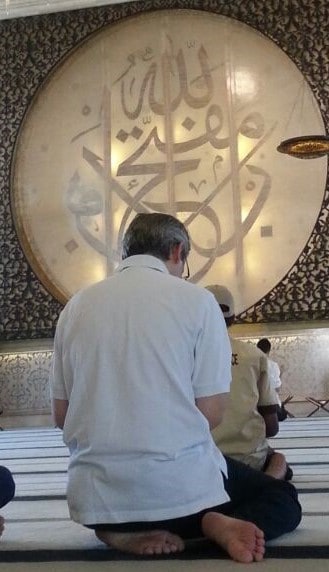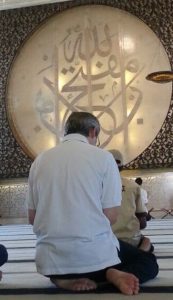Top Tips for Boosting your Du’a

by Umm Hana
How to Increase the Chances of Your Du’a Being Answered
Thereupon, Zakariyya prayed to his Lord. He said: ‘O my Lord, grant me from Your own (power) a goodly progeny. Verily, You are the One who listens to the prayer.’ So then, when he stood praying in the place of worship, the angels called out to him saying: ‘Allah gives you the good news of Yahya who shall come to confirm a word of Allah and shall be a chief, chaste, a prophet and one of the righteous.’ (3:38-39)
Upon seeing Maryam being supplied with unseasonal fruits, her uncle and guardian Zakariyya was reminded of Allah Almighty’s power to make anything possible. Inspired by this thought he made du’a to Allah Almighty to grant him a child though he and his wife were well beyond that point. Allah Almighty accepted his du’a, granting him a son, Yahya (peace be on him) who would also be a prophet. Allah Almighty is teaching us a lesson in this story about making du’a.
Here are ten simple tips to magnify the potency of du’as:
1. Pray in Seclusion
‘Light needs a pure and polished heart to reflect. Empty your heart from otherness, and He will fill your heart with knowledge and wisdom.’ (Ibn Ata Allah Sikandari)
Zakariyya’s du’a is made in seclusion. Spending time in seclusion is a common habit of spiritual people, of all religions. We find all prophets spending time in contemplation and our own Prophet (peace be on him) had spent a month(1) in the cave of Hira before he received his first divine revelation.(1) As mentioned in Shahih Muslim).
It was also his custom to spend the last ten days of Ramadan exclusively focusing on worshipping Allah Almighty, making dhikr and reflecting, which we can imitate by going into e’tikaf (seclusion) as well.
This time-out and mindfulness gives us a chance to dwell on our purpose, our life, the hereafter and the decisions we need to make. Even the academic world has the concept of taking a sabbatical to come renewed and mindfulness has become trendy.
2. Focus
Allah Almighty does not accept the du’a of a heedless heart, (as in Tirmidhi), so try not to be distracted. Shut down your apps which are draining your battery and causing your preoccupied mind to flit from thought to thought. Sometimes we are physically present but mentally absent. Instead try and achieve a state of presence, known as ‘hudhoor’. In Surat Muzzamil, we are told:
So remember the name of thy Lord, and devote thyself to Him with full devotion.’ (73:8)
Dhikr is our link with Allah Almighty. It is our login and password. If you haven’t got presence it is as if your password is being rejected and you are denied access to Allah Almighty.
3. Express your weakness and beg Allah
Zakariyya lays bare his situation before Allah Almighty, in surah Maryam he paints a vivid picture of just how needy he is:
‘My Lord, I am in a state that bones in my body have turned feeble, and the head has flared up grey with old age, and I never remained, My Lord, unanswered in my prayer to You. I fear (my) kinsmen after me, and my wife is barren, so bless me with an heir, from Your own side, Who inherits me and inherits the house of Ya‘qub. And make him, My Lord, a favourite one.’ (19:4-6)
Allah Almighty loves us to express our weakness and acknowledge our need of Him. Of course, He already knows our situation but in describing our situation in detail we make Allah Almighty our confidante – confessing to Him what we may not have disclosed to any other soul. This brings us closer to Him.
4. Praise God
Starting and ending your du’a with praise of Allah Almighty, is a practice we see throughout the Qur’an, (as well as surah Fatihah), and calling on Allah Almighty through His names. Using someone’s name explicitly emphasises our relationship with them. Zakariyya calls Allah ‘Rabbi’ (my Lord) showing his humility, deference and personal commitment to his Master, Allah Almighty.
5. Don’t Doubt before you Start
Don’t assume your du’a is futile because then you yourself are actually making it pointless. If you are unsure that Allah Almighty will grant you your du’a, you are doubting His ability to grant it. Yet He can make anything happen, so don’t be afraid for praying for the impossible.
It reflects your confidence in Allah Almighty’s power and generosity. And remember that there are always exceptions, so the impossible can become possible, if Allah Almighty wills it, as He is the One who can grant those exceptions.
Keep asking because you don’t know when Allah Almighty has decreed that you will get what you longed for. Have total certainty that your du’a will be answered. (As in Tirmidhi).
6. Choose the Best Time
Zakariyya seized the opportunity to make du’a at what he perceived as a special environment for making du’a. Allah Almighty has designated certain times and places above others for the acceptance of supplications, such as the Haram in Makkah and the last third of every night.
Of course, the month of Ramadan, Laylatul Qadr, the first ten days of Dhul Hija (particularly the day of Arafat) are all good times to make du’a.
Allah Almighty will answer all du’as, but those are the times where He is expecting the people who really love Him to call on Him and more likely to grant you what you want sooner.
When you develop the love of Allah, you will crave your time spent communicating with Him. These times bring tranquillity and contentment that cannot be found in worldly things.
One of the signs of a soul’s bankruptcy is when you prefer talking to people more than Allah Almighty.
7. Worship Purely
Be as pure as you can physically in your clothes, body and space as well as spiritually. Otherwise you risk your du’a being rejected.
8. Follow the Means
If you make istikhara du’a (du’a to decide), do not just follow a hunch.
Take your time, consider things carefully, seek advice and research your options thoroughly before you make important decisions. Du’a is not sufficient if you didn’t do your bit.
Du’as are not just passive, but need to be accompanied by active engagement with the issues that face us. For example, when there are huge political disasters, we cannot expect miracles to solve them, as we are failing to respond to the situation with the action required from us to bring resolution.
9. Extend the Scope of your Prayer
Don’t stop at praying for one thing or one person when you can follow the example of Maryam’s mother, who extended her du’a to cover all her progeny. We too can pray for our future generations and all Muslims, as Ibrahim (peace be on him) did.
10. Gratitude and Obedience
Keep increasing and improving your worship. Allah Almighty grants the prayers of those closest to Him and He has told us that He loves those who are most obedient. So if you increase your obedience you will find more of your prayers answered.
When you have been granted your wish, increase your supplications and express your gratitude through your words and actions. In particular, remember to be good to your parents and your spouse.
The Du’a of a Parent
Never underestimate the du’a of a parent. This includes the repercussions of good du’as as well as bad. There was a father who lived in an Egyptian village but wanted his son to go to Al Azhar university. His son preferred to stay and farm in his rural area. Reluctantly he completed his first year and second year but when his father brought him back for his third year, his son declared that he needed to buy a large number of very expensive books to complete his studies. He hoped that his father would change his mind and take him home when he saw the considerable bill. Though, taken aback his father, undeterred, paid for the books and took them home, where he lovingly and carefully wrapped each book individually. On parting, he informed his son that he was no fool and knew perfectly well that these books were not required, but that he prayed that his son would read all of them. His prayer for son was so powerful that his son’s attitude dramatically changed, and he made the effort to read every single book. When he returned to his father’s village he was quizzed by the curious village people about the contents of these books and he filled his father with pride when he was able to answer all the questions with sound understanding. The trajectory of this young boy’s life changed and he went on to become one of the most popular scholars of Egypt, he became the Imaam of Al Azhar, and known as the ‘Preacher of the Century’. He was loved by many as he had been granted with an outstanding talent in his power of expression. His words could be understood by lay people and scholars, so many, many people benefited from his wisdom. His name was Muhammad Mutawalli Ash-Sha’raawi and when he died in 1998, more than a million mourners filled the streets. His father’s wisdom and du’a had been instrumental in propelling him towards success.
No matter how bleak things look to us, we should never lose hope of being answered in our du’a and when we pray, we should ask Allah Almighty to only grant our du’a if it is good for us.
Related Posts
The Comprehensive Du’a – When you want everything!
How to Receive the Light of Allah
The Du’as Allah is quick to answer
The Importance of Dhikr – The Mindful Muslim
When Islam is like Oxygen in your Life
How can we use Fatiha to cure us?
Recommended Posts

What dua can I make for righteous children?
April 10, 2023



